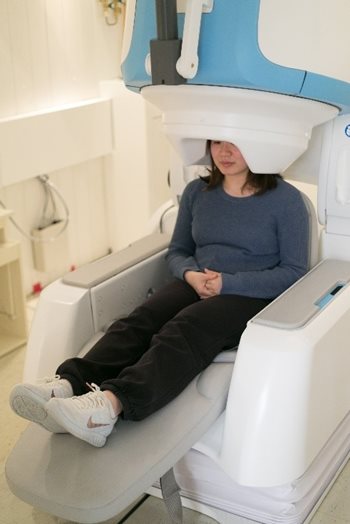Magnetoencephalography (MEG)
Magnetoencephalography (MEG) is an advanced technology used to record the magnetic fields from electric brain activity when we see a picture, listen to a sound, remember the past, plan the future or even let the mind wander. Hundreds of sensors arranged in a helmet pick up the tiny magnetic fields even without touching the head.
 Baycrest is one of few hospitals in the world equipped with MEG technology. More importantly, the in-house combination of MEG with other neuroscience technologies such as MRI, EEG, TMS and eye tracking highlights Baycrest’s unique research capability. Researchers at the Rotman Research Institute use MEG to study the multifaceted rhythms of brain waves, or oscillations, which inform how brain networks are interconnected to serve perception, memory and cognition.
Baycrest is one of few hospitals in the world equipped with MEG technology. More importantly, the in-house combination of MEG with other neuroscience technologies such as MRI, EEG, TMS and eye tracking highlights Baycrest’s unique research capability. Researchers at the Rotman Research Institute use MEG to study the multifaceted rhythms of brain waves, or oscillations, which inform how brain networks are interconnected to serve perception, memory and cognition.
MEG operates silently, which makes it ideal for studying hearing. One focus of ongoing research is discovering the brain mechanisms of auditory perception, speech understanding and speech production, and how those are affected by brain changes in older age. MEG can detect changes in brain function before they are manifested in behavioural changes or impairments, making MEG essential for the early detection and prediction of cognitive decline.
Learn about Baycrest research that uses MEG:
Individualized brain stimulation therapy improves language performance in stroke survivors, finds Baycrest study